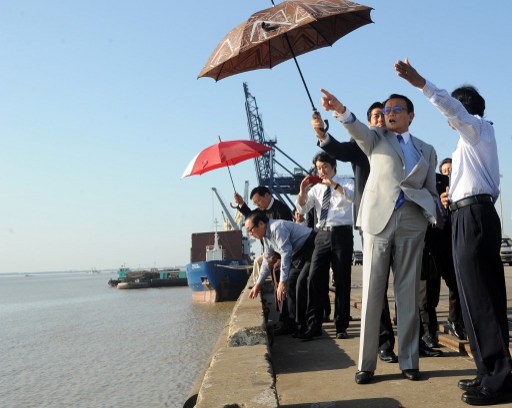Burma’s vice president opened on Wednesday a $1.5 billion manufacturing complex aimed at luring investment and creating jobs, showcasing government work on developing the economy in the run-up to the general election.
Vice President Nyan Tun, a close ally of President Thein Sein, unveiled the first phase of the 2,400-hectare (5,900-acre) Thilawa Special Economic Zone (SEZ) at a ceremony at the site, an hour’s drive from the commercial capital of Rangoon [Yangon].
The plan is for the zone eventually to host about 100 factories employing more than 40,000 people.
“I personally take this moment as a dream come true,” Nyan Tun said at the opening ceremony.
The project has been backed by the Japanese government and its trading houses, including Mitsubishi Corp, Marubeni Corp and Sumitomo Corp as well as the Japan International Cooperation Agency.
Nyan Tun said the zone would boost Burma’s ties with Japan.
The project’s opening will also likely boost Thein Sein’s ruling Union Solidarity and Development Party (USDP) as it ramps up its campaign ahead of Burma’s first general elections since the end of military rule, on 8 November.
The military-backed party has centered its campaign on showcasing investment, economic growth and reforms under the semi-civilian government it has led since reforms began in 2011.
“Thanks to the leadership of President Thein Sein, Burma has been reformed in terms of democracy, national reconciliation and economic reforms step by step,” Japanese Finance Minister and Deputy Prime Minister Taro Aso said in a speech at the ceremony.
[related]
Burma has had close ties with China in recent years and Japan has been seen as striving to build its economic relations with Burma since the lifting of most sanctions by Western governments in response to reforms.
Of the total 2,400 hectares earmarked for the complex, the government on Wednesday opened the first 400 hectares, where more than 70 percent of the land has been parceled out to 48 companies from 13 countries.
Foreign direct investment in the impoverished country of more than 50 million people jumped to $8.1 billion in the last fiscal year from $329.6 million in 2009/2010, before the military stepped back from power.
The International Monetary Fund forecast the Burmese economy would grow 8.5 percent this year.
Burma is planning two other Special Economic Zones – in Dawei, a southern port near the Thai border and Kyaukpyu on the its Bay of Bengal coast in the west but the government has made Thilawa the priority.
Read more about Thilawa.
Read more about SEZ’s here.



